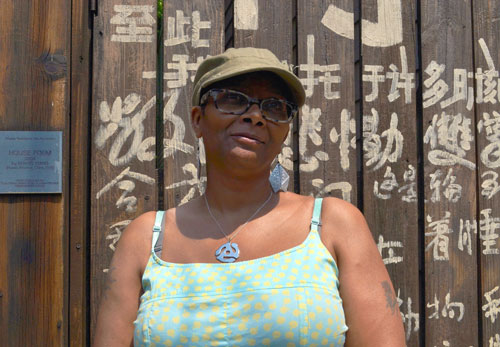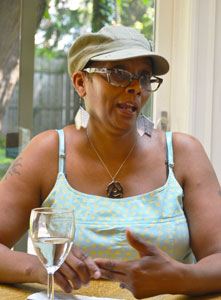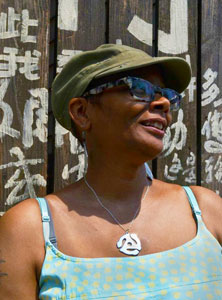An Interview with Poet Bonita Lee Penn
by Mariana Centeno / June 15, 2012 / 4 Comments
“Say it out in the open. This is what really happens in America.”
Bonita Lee Penn is a passionate, captivating, and sometimes controversial poet from Pittsburgh’s North Side, who released her second collection of poems, The B Side, this year. Immersed in Pittsburgh’s literary scene, she runs a writing workshop for young poets and serves as the Editorial Manager of the Soul Pitt Writer’s Block, the literary section of Soul Pitt, a community website for minorities. With this position Penn works to curate a positive and supportive space where other writers’ voices can be heard.
Sampsonia Way sat down with Penn earlier this month to talk about her life as a writer. In this interview she speaks about some of her poems, describes her inspirations, explains her vision of Pittsburgh’s writing community, and provides some advice for young writers.
Not only do you conduct interviews with important writers in Pittsburgh, but you also review literary events. What moved you to create the Soul Pitt Writer’s Block?
I started with the Soul Pitt Writer’s Block as a venue for mostly local poets and writers to promote their work; as they didn’t have the finances to do this on a large scale. This is my whole mission: To help other writers to get out and show their work to the public.
How do Pittsburgh and the literary community get along nowadays?
There are still a lot of different cliques in Pittsburgh, different groups of writers. Unfortunately, we don’t embrace each other as we should. That is another reason why I started the Writer’s Block blog, because I wanted to foster people’s curiosity, but I haven’t gotten there yet.
I was involved in a supportive writer’s community when I attended Carlow University. I was part of the Mad Women in the Attic writing workshop , and from there I met a whole different set of writers, mostly women. We attended readings at Chatham, Pitt, the August Wilson Center, and my network of poets grew. My dream is to be able to say that Pittsburgh has the best writers’ organization. It could still be a lot of different groups, but we should all get together once a month, or once a year, for a great writers conference. That dream is what is going to keep me in Pittsburgh.
What are the main differences between the Pittsburgh of your childhood and the Pittsburgh you live in today?
I grew up Sewickley about 13 miles outside of Pittsburgh. It was a borough with a majority white community, with a small population of established blacks who were there approximately since the seventeen hundreds. A lot of the older gentlemen were part of the Tuskegee Airmen. Where I grew up we had issues of race, but it wasn’t as explosive as in the city.
I can’t say my childhood was a fairy tale, but as a child racism was alive to my parents. I did touch on it in a couple of my creative nonfiction essays that focused on my childhood and high school experiences. As children, we had fun, we played outside all the time. We played in the woods for hours, with our parents never worrying about us being harmed. We walked for miles from one part of town to the next. I had a very happy childhood.
Growing up in Sewickley was a unique experience for a black child. The town held a rich mixture of black history with living around a community of privileged whites. We had the best of both worlds, economically and education wise and I’m very appreciative that my parents decided to raise us in Sewickley, even though I fussed about the lack of black boys to date.
When I moved to the city as a young adult it was like a culture shock, because I was never around a lot of blacks. Of course I loved it. It was the first time I was around my own people and I didn’t have to worry about how I acted or looked. But when I first moved to Pittsburgh, my neighbors could tell that I didn’t grow up in the city; I still acted like I lived in the suburbs, and they said that I “talked white,” and that I “dressed white,” but I thought it was funny, and I’m still the same person.
The culture of the city was more than being around blacks. As an adult I came in contact with racism and discrimination when searching for a job and treatment on the job. But as far as the communities go, they were very colorful. Now things are changing, the suburbs have moved into the city and a lot of things are changing.
Would you like to go back to Sewickley?
No. The city is different and noisy, but I still love it. I wouldn’t live anywhere else; I couldn’t go back. What I do miss is the old-fashioned values of people. In Sewickley everyone knew who you were, they knew your parents, they spoke to your parents, they had no problems telling you that you needed to act right. When I came to the city with my children I couldn’t really go to another child and say, “I’m going to tell your mother you’re not acting right,” because they or their mothers would curse me out. The world now has a whole different set of values.
Did you realize you liked writing when you were a child?
Yes. I always loved to read and when I was in seventh grade my English teacher read one of my poems called “Sand Castle,” a love poem. It was about a teenage crush and broken heart. My teacher, Mrs. Koehler told me that I should keep writing. I started writing to express myself in ways I could not verbally, and I have been expressing myself ever since.
Your poems touch on controversial topics. Where do you get the inspiration to write?
I develop my own writing by reading other people’s work. As a poet you would think that I would read other poets, but I find my inspiration in fiction and nonfiction books, especially books by James Baldwin. His book Go Tell it on the Mountain was the first book that my mother bought me when I was twelve or thirteen, and when I read that book my mind felt like it was on another planet. Baldwin is such a gifted writer, he has every word in the right place, and that book still speaks to me. I also love Nikki Giovanni , Sonia Sanchez and Maya Angelou.
“The younger generation feels as though racism doesn’t exist anymore. They say they have never experienced it, they think, ‘That’s just how people are,’ and no, that’s not how people are.” –Penn
Something I find particularly interesting is the historical settings of your poems. Why is it so important for you to be attached to historical events?
The history our children are taught only touches the surface of American culture and the culture of other countries. I have three daughters who went through the Pittsburgh Public School System and I know they are not taught the entire and truthful history of Blacks in America or in Africa. That’s why I always pull pieces out of history into my poems. I want to share this history with my readers. In my poems I compare past events with the present, always developing a common thread, because things really haven’t changed.
I also enjoy people’s reactions, “Oh my God, I didn’t know that happened.” My poem “Orangeburg, South Carolina” relates to the protest and the massacre that took place in 1968. That is something that happened when I was a teenager, but I wasn’t aware of it. When people told me about it I was surprised and embarrassed because I didn’t know. I felt terrible. That’s why I place history in my poems, for those who are not aware of what has been happening in America. The younger generation feels as though racism doesn’t exist anymore. They say they have never experienced it, but they have, they just don’t know it because they think, “That’s just how people are,” and no, that’s not how people are.
There is a poem you wrote called “Rivers Run Red.” You make reference to the Colfax massacre, to the Atlanta race riot, to the Houston riot, to the East St. Louis Riot, and many more. Could you talk about this poem?
I wrote the first draft of that poem about twenty years ago. The one that you read is the 2012 revised poem.
I remember when I first started writing it, I was reading James Baldwin and Amiri Baraka and I was so upset, I had to write about my anger. Of course the more research I conducted, the more information I found. The most important part of this poem is that the dates and places were of real riots that happened in America.
People think that racism just started yesterday, that the riots in Los Angeles were the first, but no, they weren’t. That’s why I relate it to all those riots from the 1800s. People also need to know that it wasn’t always black people rioting against other black people. Most of the riots that I mention in my poem are the riots that white people had against us. It is a piece of history that I think is unknown to most people. We can keep adding people’s names to it. I just added a couple of names for this year.
However, I enjoyed working on “Rivers Run Red.” It reflects the deep racism in this country.
Do you think that people are still afraid of talking about racism?
People shouldn’t be afraid to talk about it, because it is something that is part of our reality, and I’m not going to become angry at someone if they want to talk about it. Say it out in the open. This is what really happens in America and everybody should know that.
Since the election of President Barack Obama some people believe that the United States is in a “post-racial age.” What are your thoughts about this argument?
That is a joke! I don’t know who the heck said that (laughs). It is ridiculous. It is not the same in America as it was before he was president—it is worse. America has gotten worse because everybody is talking about race now, but they are not thinking of a way to solve any problems. They are talking about it as they are disrespecting the man. It doesn’t bother me if you don’t like the man, but respect him.
A lot of black people were saying, “Obama is not doing anything for black people.” Well, because he is not the president of Black America, he is the President of the United States, and he has to think about everybody in the country. He is a human. Stop thinking about his color.
Besides, the President doesn’t always have the last word. We have Congress, the Senate, the House of Representatives, they all have a say on things, and if they don’t like it there’s nothing he can do. That’s the way it is. Most of the representatives in the Senate and House are Republicans, what can the man do?
I don’t believe in that “post-racial” thing at all. All we can do is improve the community where we live. Spread love to everybody.
Where did you get the inspiration to write the poem “Absurdity or if I hear one more racist thing about the President of the United States?”
That was written last year. It came about when Rick Perry called his camping retreat “Niggerhead” and that was all on T.V. That day, they were talking about “Niggerhead,” and the guy said, “It has always been that way since the 1700s. I mean, that’s the name.”
As a writer my mind is always someplace else, and that day I was walking down the street thinking about all the white people walking towards me what do they think when they see me? Do they want to spit at me? Do they want to slap me in my face? Do they want to call me “nigger bitch”? I felt all of those things and wrote the poem.
“A writer has to find what works for them. You have to become comfortable in your poet skin.” –Penn
Your poems also reflect your interest in women issues and different cultures.
Since I’m a woman, I’m interested in the treatment of women in other countries. I guess you can call me a feminist—I just want equal rights for everyone As a woman that is sensitive to the needs of women, I know that women in other countries don’t have the freedom that I have (which is still really limited). It hurts me that they’re being treated unfairly; it hurts me as a human being and as a woman. I don’t understand it.
When exiled women share their stories at City of Asylum readings, you can hear the similar thread of struggle in their poetry as those of American women poets and in my own poems, everyone wants freedom and want to be treated equally. They don’t want to be oppressed.
Apart from writing poetry, you also give workshops. Your last workshop was about sharing history through poetry. Please, tell us about it.
Last Saturday, May 19th, I facilitated a writing workshop for teenagers at the Carnegie Library in Homewood. I taught the students how to write about history in a poem. I had a picture of one young man with a gun, and another picture of a man with a war hat. I picked them from an exhibit downtown called Congo/Women. I asked the students to write what the pictures said to them. A 15 year-old knew that the guy in the picture was from the Congo, that he was a boy soldier, and that he had to kill his parents. She gave him a name and wrote her poem based on fact. She didn’t want to read it at first, but everybody has to read—if I have to read, everybody has to—and it touched me. They asked if I would come back to facilitate workshops in the fall with the girls and I’m really excited to work with them.
Could you give our readers some writing tips?
The first tip is to remember that there are different ways to write poetry. When I was a young adult writer I stopped writing for nine months because I didn’t write like Nikki Giovanni. But now I understand that I don’t have to write like her to be a good poet. A writer has to find what works for them. You have to become comfortable in your poet skin. Also, find a good writing workshop. When I first participated in the Mad Women in the Attic workshop, the dynamic was to read a poem, other women would offer suggestions, and you’d just take what you want to revise your poem. You don’t have to take everyone’s advice. In addition, as a writer you should read a lot—not just poetry—you need to acquire the habit of reading. You have to read to write.








4 Comments on "An Interview with Poet Bonita Lee Penn"
Fantastic, insightful article about an admirable poet
Excellent!
Enjoyed the article. Poems are outstanding!
Wonderful article! It was great to see you at the Mexican War Street readings!